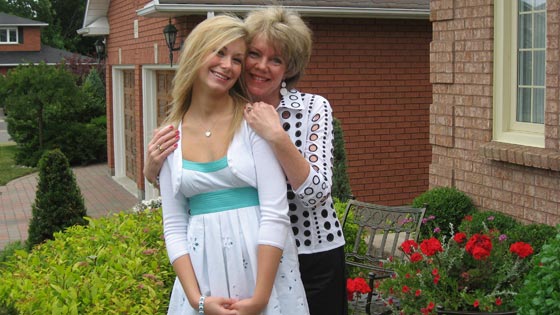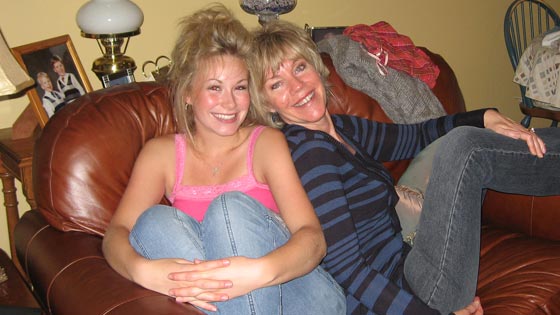
Jessica Clapp, photographed with her mom, wanted to pursue genetic testing for ovarian cancer after her mom was diagnosed with ovarian cancer at the age of 50. Jessica's mom passed away after a two-and-a-half year battle. (Photo: Jessica Clapp)
After watching her mother battle ovarian cancer for two-and-a-half years, Jessica Clapp started to wonder about her risk of having ovarian cancer and what it would mean when she was ready to start a family of her own.
Jessica made an appointment with a genetic counsellor at the Princess Margaret Cancer Centre with the hope of addressing the many questions she had. During her appointment she was told about the Prevent Ovarian Cancer Program (POCP).
The POCP is an initiative from the Princess Margaret Cancer Centre that aims to identify women in Ontario with a first-degree relative who has died from high-grade serous ovarian cancer, offer panel-based genetic testing for BRCA1/2 genetic mutations, and provide participants with genetic counselling that will help inform decisions about reducing the risk for ovarian cancer.
Once eligible, participants must give the research team permission to access the pathology report for their deceased relative, complete a family history questionnaire and several psychosocial questionnaires, participate in genetic counselling (before and after the genetic test), and provide a blood sample for genetic testing.
Since the program's launch in 2015, more than 345 women across Ontario have registered to see if they qualify. Many women have already completed genetic testing and have received their test results.
Jessica shared her experience with genetic testing and what it was like to participate in the POCP with UHN News.
She hopes that her story will help future participants better understand the POCP process and the implications of genetic testing for hereditary ovarian cancer.
Related to this story
Who was affected by ovarian cancer in your family?
My mother was 50 years old when she was diagnosed with ovarian cancer in September 2008.
She underwent her first treatment at Kingston General Hospital, followed by treatment at Lakeridge Health Hospital in Oshawa, and finally Princess Margaret Cancer Centre when she was accepted into an experimental drug trial for ovarian cancer.
Sadly, my Mom passed away in April 2011 after battling cancer for two-and-a-half years.
Before participating in the program, had you known about
BRCA1/2 gene mutations and hereditary ovarian/breast cancer risk?
I understood that the BRCA1/2 gene mutations were related to breast cancer. However, I did not realize the mutations in these genes were related to ovarian cancer as well. Also, I did not realize that mutations in the BRCA1/2 genes could be hereditary.
Why was participating in the POCP important to you? Specifically, why was participating in genetic counselling and testing important to you?
Since my mother's diagnosis, I have always thought about the possibility of having a hysterectomy and/or a mastectomy after I was finished having children, in order to reduce my risk of breast and ovarian cancer.
I also wanted to know if there was a risk that I could potentially pass on these hereditary mutations to my future children if I was a carrier of the BRCA1/2 gene mutation.
Since ovarian cancer does not have clear warning signals and is often diagnosed late when the disease has already progressed, it was also really important to me to do all I could to help my family distinguish whether or not this gene mutation was present in our family tree.
Dr. Marcus Bernardini, principal investigator behind the POCP and a gynecological oncologist at the Princess Margaret Cancer Centre, answers frequently asked questions about ovarian cancer. (Video: PMCF)
How did you hear about the POCP?
I heard about the Prevent Ovarian Cancer Program after an appointment with a genetic counsellor at the Princess Margaret. Unfortunately, I was not eligible to undergo genetic testing under the provincial regulations.
However, the genetic counsellor suggested I should apply for genetic testing though the POCP and briefly gave me some details about the program and directed me to the
preventovariancancer.ca website.
I read through the website that same evening and the very next day I completed my application.
For other women who are considering participating in the program, can you describe the experience from the beginning to where you are now?
My overall experience with the POCP has been absolutely wonderful.
Everything is done in a very organized manner, with very little time responsibilities (questionnaires take about fifteen minutes maximum). E-mails are provided well in advance to let participants know what steps in the program are next and what forms are needed to be completed.
In addition, there is absolutely no travel time required, every stage of the program can be completed via e-mail and the actual blood test can be done at a Life Labs location in whatever city you are currently living.
I'm at the stage in the program where I have finished the psychosocial questionnaire required one week after receiving my genetic testing results and waiting to receive the psychosocial questionnaire required three months after receiving my genetic testing results.

Jessica, pictured with her mom, says she is glad she participated in the POCP to have the knowledge of her risk as she thinks about starting her own family someday. (Photo: Jessica Clapp)
How did you find your overall experience in the program?
I cannot give enough praise to the Prevent Ovarian Cancer Program! The staff members and counsellors are so helpful and they have arranged the program so it is incredibly easy to move through the various stages.
The POCP website has a lot of valuable information and is simple to navigate. Information and consent forms that need to be signed are sent via email and in a timely manner. Most importantly, if you do ever need information, the POCP staff are very helpful, friendly and quick to respond to any inquiries.
Both phone interviews I had with the genetic counsellor were wonderful experiences. Before giving my blood sample, a genetic counsellor called to discuss the information that would come from the genetic test, as well as allowed me to ask any questions I had regarding the process. My genetic counsellor did not make me feel rushed, or insecure about the questions I was asking.
A genetic counsellor also called after receiving my results. Again, this was the perfect opportunity to get clarification and better understand what my personal results meant and to ask about next steps.
This one-on-one counselling opportunity is a vital part of genetic testing, providing support and guidance, and the POCP does a superb job of this!
How has the genetic information you gained from the program affected you?
My family has been incredibly supportive of my choice to participate in the POCP.
Upon receiving the result that I was negative for mutations in the BRCA1/2 genes, we were all very happy. It is a great feeling to be able to have this knowledge as I approach the stage in my life where I am thinking about having children over the next few years.
However, my family and I realize this is just one small piece of the puzzle in terms of mutations in the BRCA1/2 gene in our family tree. There are different scenarios that could lead to a negative result, which the genetic counsellor discussed with me (e.g., there is always a chance of receiving a false negative with any type of test).
Another reason could be that my mother may not have passed the mutations along to me, but did have the mutations in the BRCA1/2 gene herself. Therefore, it is important for other family members to also get tested to complete the puzzle, or to gather a more complete view of our family's genetic story.
Since ovarian cancer does not have clear warning signals and is often diagnosed late when the disease has already progressed, I strongly believe genetic testing is one of the best routes for early detection at this point in time.
I sincerely thank all those involved in the Prevent Ovarian Cancer Program and I am so thankful I was given the opportunity to participate.
